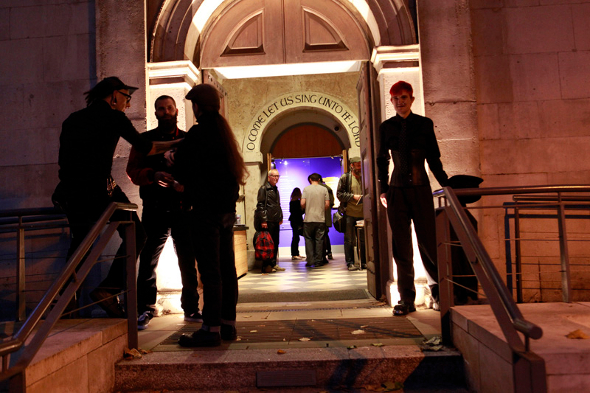Unsound London: In Review
Ahead of Unsound’s Krakow event, we dispatched Josh Hall to take in the festival’s London debut which was spread across venues in the capital on the final weekend of September.
Unsound has rapidly become one of the most important events in the experimental music calendar. The Krakow festival is known for its combination of well-loved international acts and artists that are yet to become known outside Poland, as well as for the careful attention paid to venue choice and production. According to Unsound the biggest non-Polish audience for the festival comes from the UK, and it therefore seems like good sense to expand their international franchise in London, with a series of events set across five days and held in venues ranging from the painfully established to the virtually unknown.
Unsound London’s opening event is held at the BFI, a warren-like building set beneath Waterloo Bridge. There the evening begins with Warsaw’s Anna Zaradny, who opens her set with a handheld controller from which she produces long, interlocking tones. The music swells slowly, the tones sometimes shuddering over themselves, with something of the subterranean about them. Soon, though, they become more celestial, twinkling easily where they had grumbled before, and by the time a kick arrives, and only for the briefest moment, it is easy to have forgotten that percussion existed at all.
The evening’s headline performance comes from Demdike Stare, in collaboration with Krakow’s Sinfonietta Cracovia and video artist Michael England. The group play a short set of pieces, including one from their excellent Testpressing series, that play with the counterpointing of grim but controlled noise and occasional, barely present string delicacy. The most interesting parts of the set come when the Sinfonietta is pushed further to the foreground. There are all too brief moments during which the violins are gently treated, or in which they each play the same figure but out of phase, to disorienting effect, leaving a tantalising idea of what could have been had the strings formed a more integral part of the performance.
Later part of the crowd decamps to the unfortunately named Hysteria, a tiny, boxy basement club in Dalston. Here Emptyset’s Paul Purgas dominates a line-up that also features Lee Gamble and Vester Koza, His set opens with a track featuring a Frenchman reciting numbers (mai oui, bien sûr), before quickly heading towards the intersection between techno and post-punk. Purgas is an expert selector, making even the most familiar records sound fresh and vital, as evidenced by the reaction enjoyed by the appearance of a Factory Floor track.
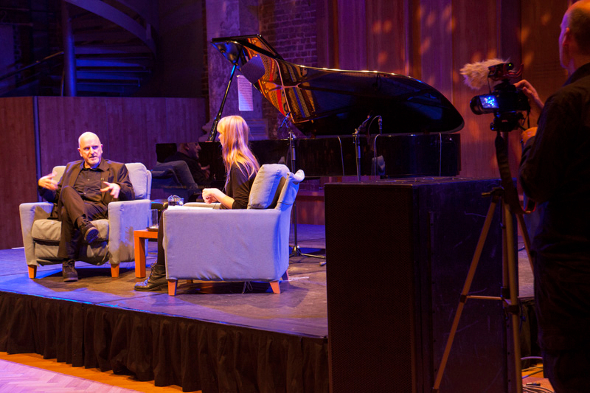
Perhaps the most anticipated show of the festival, though, is also the least productive. Lustmord has recently come out of a two and a half decade live retirement – a period of absence caused in part, he says during a pre-show Q&A with The Wire’s Jennifer Allan, by of a lack of interesting venues in which to play. It is clear why he came out of hiding for LSO Saint Luke’s. The Old Street church, a functional, grey building in need of a scrub, looks inauspicious enough from the outside, but its refurbished interior now makes it one of London’s most visually arresting venues, with spiral staircases bookending a wide stage backed by thick wood panelling. It is easy to imagine that Brian Williams, the unassuming middle-aged man behind Lustmord, was also attracted by the irony of playing in God’s house, particularly given his history with the Church of Satan. Indeed, the floor-length black leather-clad crowd hanging out in the crypt beforehand is the stuff of cognitive dissonance dreams.
In the event, though, the show itself is entirely underwhelming. Bookended by cheesy, pseudo-Richard-Burton-does-Milk-Wood vocal samples, the set meanders through a series of standard issue rumblings and howling wind sounds before eventually alighting on a slightly more interesting set of pneumatic bass drills. It is occasionally pummelling enough to give the lie to the notion that Lustmord’s work is entirely ambient, but there is little narrative or variation here. In any event it is virtually impossible to concentrate on the music, though, such is the distracting awfulness of the visuals. Fire emanates symmetrically from either side of the huge screen behind the stage, while runes slowly rotate in the background. The whole affair seems painfully lacking in self-awareness, as if Williams has had a Lustmord show described to him without ever having actually conducted one.
The evening is not a complete write-off, though. Earlier 22 year old pianist Piotr Orzechowski, otherwise known as Pianohooligan, plays a set of fascinating jazz deconstructions. He looms over his grand piano, lid open, and scrapes at the strings to create shrill counterpoints to startlingly executed melodic figures. The performance oscillates between louche, neo-soul chord progressions and voluminous abstractions, a contrast rendered most clearly in the final piece, in which he rips apart Badu-esque chords, splitting them into uncountable series of individual neurons, each of which misfires in turn, before demolishing the entire construction with a passage in which he plays pick-up sticks on the strings with a pair of timpani mallets, then using them to produce furious swells of bass from the far end of the piano. It is a truly virtuosic performance, demonstrating both an extraordinary proficiency with jazz fundaments and a propensity for unfettered experimentation.
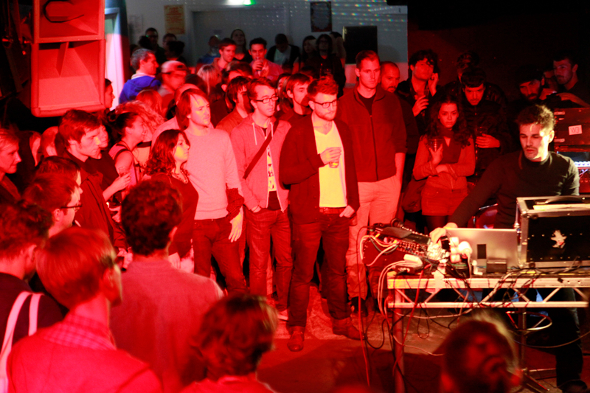
On the Saturday Unsound partners with London experimental promoters du jour BleeD, reconvening in Elephant & Castle where, in what might constitute the first sign of the apocalypse, the opening act manages to break Corsica’s soundsystem. Robert Piotrowicz plays by the sound desk, facing the stage, effectively in the round. He sits on a swivel chair in front of a table mainly occupied by a Doepfer A-100, around which are situated a handful of pedals and faders, and to the right of which sits a big mixing desk. Piotrowicz’s music sounds like Keith Fullerton Whitman’s death throes, with pinging digital melodies fluttering around themselves, shot through with the sort of bass frequencies that thump you right in the larynx. His set is stymied, though, by what sounds like a blown speaker, leaving the bass to stutter and crackle so badly that he abandons it midway through. He returns ten minutes later but, sadly, never finds his groove again.
The problem has been fixed by the time Durian Brothers appear, and they proceed to give one of the most generous, enjoyable performances of the festival. The trio play prepared turntables, making adjustments with elastic bands around the tone arms or, more frequently, by playing surfaces like crumpled paper, using the needle jumps to produce their percussive elements. Perhaps the most surprising element of Durian Brothers’ performance, though, is the contrast between its content and the tools with which it is made. Although the set begins in ambient mode, it soon ratchets up and cycles through an increasingly thundering series of dub and jungle tracks. It seems great testament to the trio that they can produce one of the most straightforwardly fun sets of Unsound without their comparably abstruse gear ever seeming gimmicky.
Forest Swords close the sold out show with a set that demonstrates quite how much more accomplished a live act they have become in the last two years. Live, Forest Swords are furiously dubby, playing with the contrast between scratchy samples and swaggering, vaguely nefarious sounding bass guitar. Matthew Barnes inserts slivers of vocal, sliced violently from their original context, and uses them to puncture the hazy atmosphere, producing an effect that is often very much like that favoured by John Talabot. Towards the end of the set he plays an electric guitar, from which he wrenches unearthly utterances, entirely recovering the performance from the misjudged insertion of an unnecessary jungle beat shortly before.
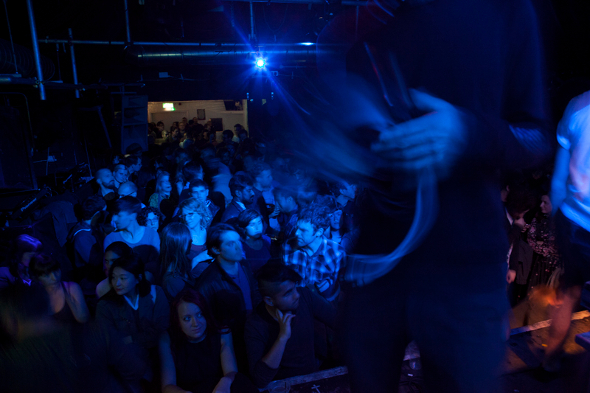
The real highlight of the programme, though, comes on the final night. Café Oto is perhaps the most obvious location to host Unsound, and tonight its sound is augmented by a specially installed quad PA which is put to most impressive use by the best act of the week. Innode appear as a two-piece featuring Stefan Németh and Bernhard Breuer, although their recent Editions Mego album Gridshifter featured three members. The pair play at right angles to each other, one with a Moog Voyager surrounded by a handful of controllers and pedals, and the other at a small jazz drum kit. Together they play extraordinarily precise, almost telepathically well-rehearsed music that sounds something like Emptyset with the distortion turned down. Kick-like synth pulses form the bedrock of the set, augmented by tightly controlled sonar bleeps, but it is in the interaction between electronics and drums that Innode’s real boons are evident. The drummer seldom plays conventional patterns on his kit, instead preferring to add new timbres through the use of, for example, an upturned cymbal on top of his snare, about which he scratches with metallic brushes. That snare also has a contact mic attached, and the drummer uses it and a sampler to produce cascading delays that situate his percussion within an endless hall of mirrors that can be entered and exited without warning.
Poland’s Stara Rzeka is perhaps the most hotly tipped act of the evening, and in the early phases of his set it is easy to see why. Set with his guitar behind a table crammed with pedals, Jakub Ziołek plays music that swoops between highly digitised crunch and cathedral-like pomp. The ease with which Ziołek incorporates seemingly wildly different styles and forms into his own, magpie-esque music is impressive, his set sashaying between black metal tropes, folk delicacy, and EBow-assisted pseudo-synthesiser music (with all of the sounds produced by his guitar). He samples his own soprano, repeating phrases incessantly, over drone chords as easily as over John Martyn finger-picking, and the entire set seems to consist of a gradual swell, punctured at the very end by an elegiac choral passage. It is a set that draws very explicitly on an impressively broad palette of references, but at times, regardless of how noisy it sometimes becomes, the combination of fractured fretwork and bromidic lyrics (at one point he turns in an unconvincing cover of Nico’s “My Only Child”) leave an inescapable sense that you might be watching a Bright Eyes concert.
BNNT, meanwhile, are an altogether different beast. One wears a balaclava; the other wears sheaths of magnetic tape around his face. The first plays drums; the second plays…well, it’s not quite clear what he plays. It sounds like a baritone guitar amplified through Beelzebub’s own valves, but it is in fact a three foot, homemade surface to air missile, complete with tail fins, that seems to have been crafted out of plastic and slung low across the shoulders. The guitarist places both hands above the instrument, appearing to play power chords the wrong way round. They play loose, sludgy metal, the clearest reference point for which is Lightning Bolt, occasionally slipping into an ungodly tango. Towards the end of the set the guitarist/rocketeer jettisons his instrument, punching a microphone at the crowd as if a maraca, and crawling beneath the front row’s chairs. It is a welcome gear change, and one that seems to explicitly hark back to Napalm Death, the band for which headliner Nicholas Bullen is best known.
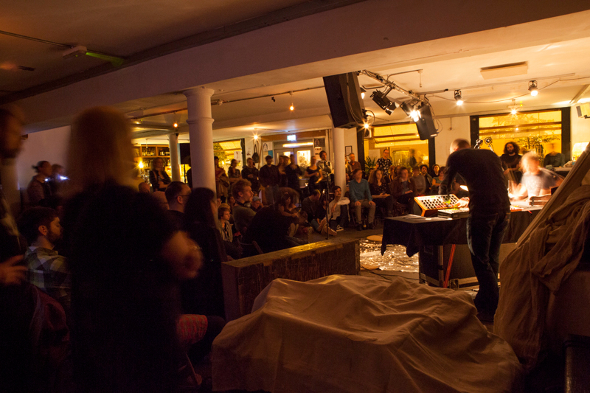
Bullen now plays pummellingly loud electro-acoustic music that thunders and screeches seemingly relentlessly, before suddenly collapsing into periods of near silence. He mops at his forehead with a handkerchief every few seconds, before returning to his apparently handmade boxes or poking at the mixing desk that takes up most of the table in front of him. At times Bullen’s set bears comparison with Rashad Becker’s Traditional Music of Notional Species, but here similar animalistic sounds, produced as if to have emanated from a physical body, are recast a roaring, furious exhalations, quite in contrast with the artist’s natty floral shirt.
Unsound London succeeds through variation. Its programmers have the foresight to recognise that four days of club shows, or four days of seated ‘art’ shows, would soon begin to grate. Instead, through a combination of the two, and through the intelligent contrasting of accessible, crowd-pleasing acts like Durian Brothers or Forest Swords with more recondite work, the festival offers a constantly surprising, perpetually entertaining programme. Just as important is the introduction of Polish artists who have not yet enjoyed the exposure they deserve in the UK. This thread of the festival could be drawn out further next year, offering a more in-depth exploration of what is clearly a very healthy experimental ecosystem; indeed, given the quality of the work on show this year it seems sensible to abandon some of the big-ticket acts in their favour. A hugely enjoyable four days, and a very good omen for the future of Unsound London.
Review by Josh Hall
All photos courtesy of Elżbieta Piekacz
